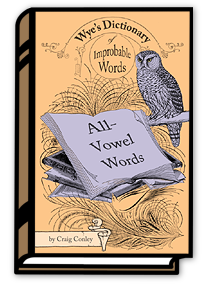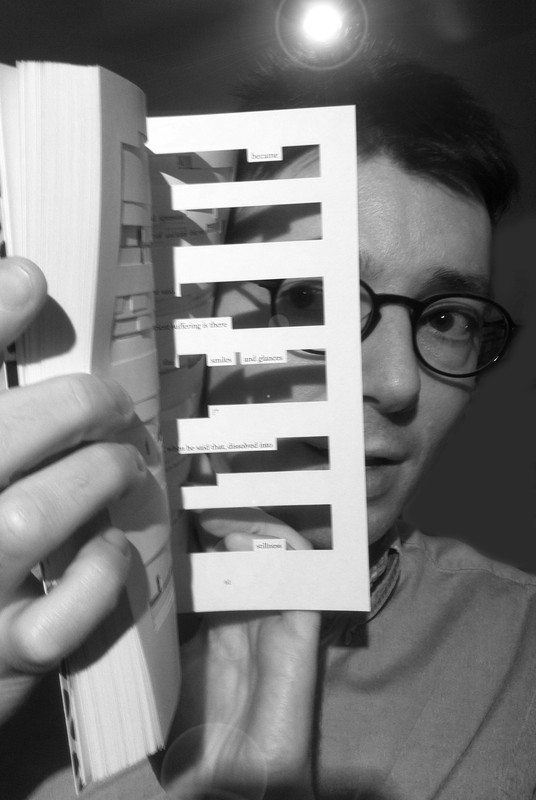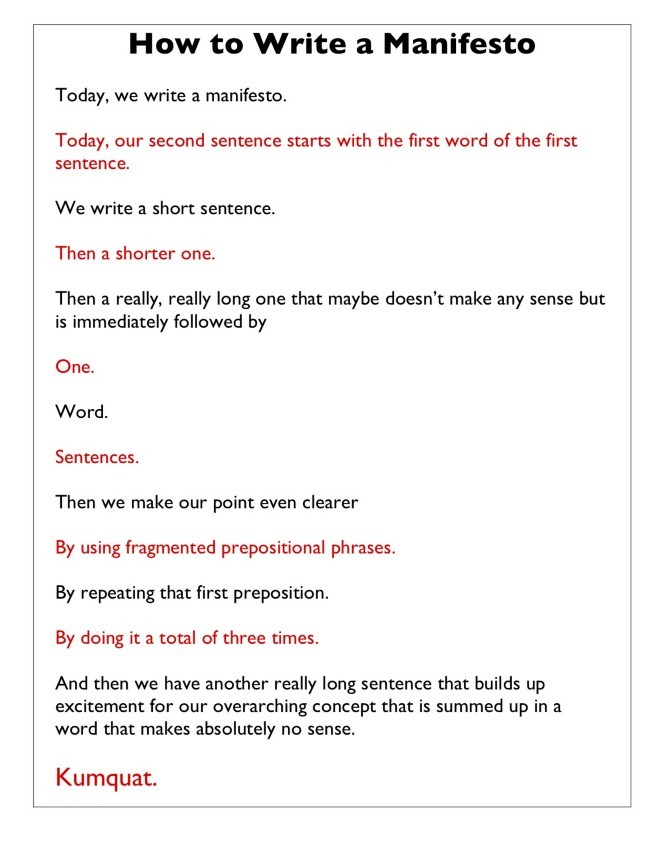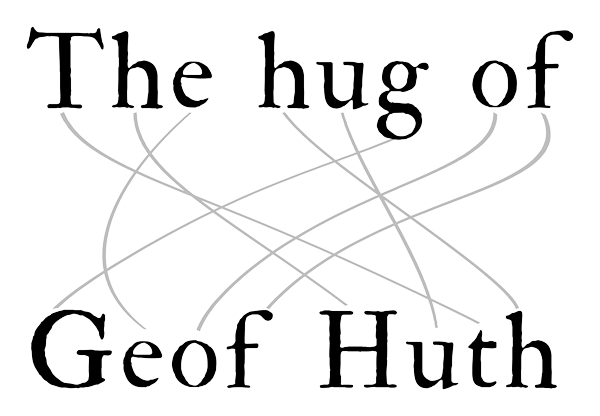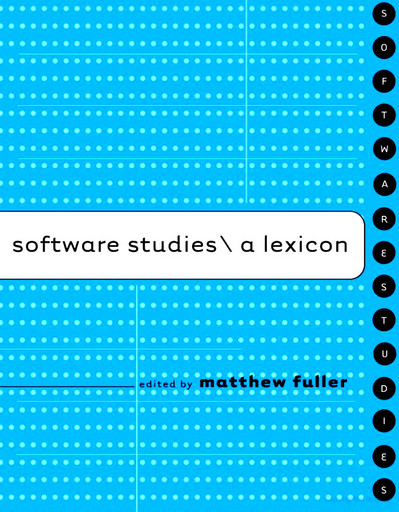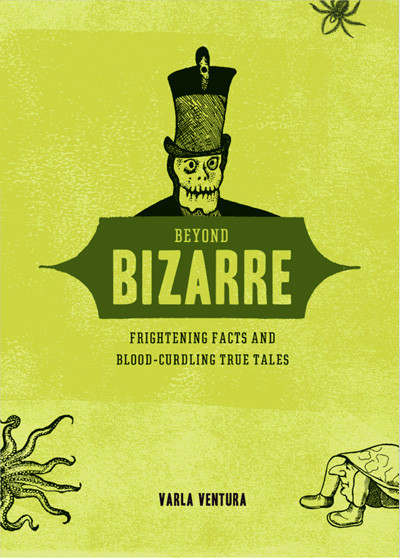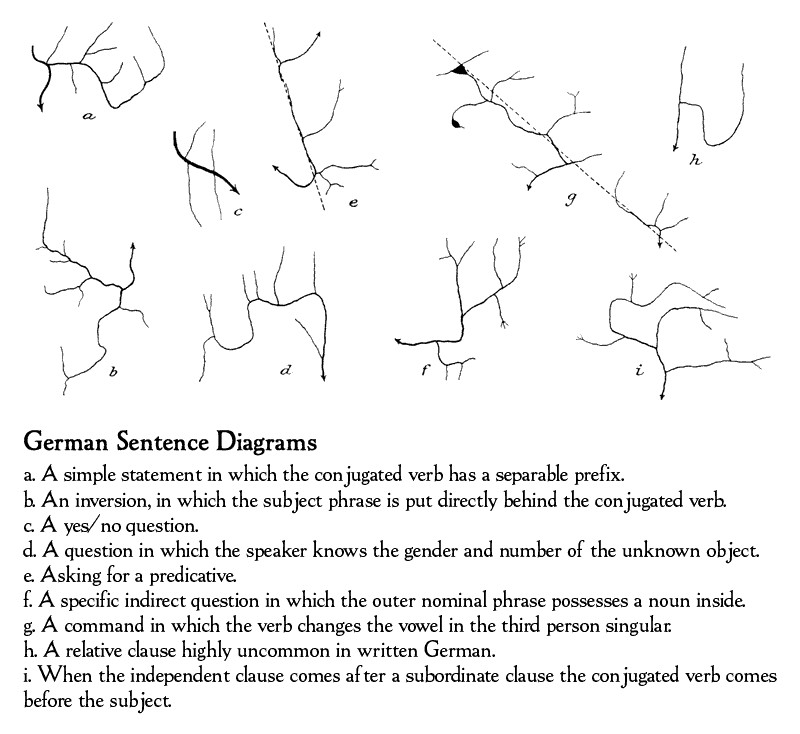



 |
|
|
 |
 |
 |
A lovely review of our dictionary of magic words, from the Silver Star Journal:
A massive and truly amazing tour de force of linguistic
dexterity, merging sorcery, etymology, history, and literature into a
global cascade of words of power magical and otherwise, drawn from
countless ancient and modern civilizations. The art of Grammarye meets
literary erudition, with each word examined, explained, and illuminated
by wild and witty quotations from countless sources. Spells, mantras and
Qabala meet slang, hokum and poetry. Enormous fun, and about thirty
pages devoted to aspects of Abracadabra and its variants alone! Big fun!
Hours of creative playtime! |


 |
|
|
 |
 |
 |
"It is impossible to understand how millions and millions of people all obey a sickly collection of gentlemen that call themselves 'Government!' The word, I expect, frightens people. It is a form of planetary hypnosis, and very unhealthy." —Leonora Carrington, The Hearing Trumpet |

 |
|
|
 |
 |
 |
Here's a guessing game. How many pages did a reader make it through Metaphysics of the Supernatural as Illustrated by Decartes before scrawling an expletive in the margin? There are 65 pages, so your guess should be from 1 to 65. To reveal the bad word in question as well as the correct page number, click the image below. |

 |
|
|
 |
 |
 |
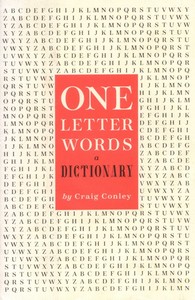
Is our One-Letter Words: A Dictionary a sham? Australian secondhand book dealers Huc & Gabet discovered our tome amid Latin and Yiddish dictionaries (we approve), then asked a bookseller and a scientist (who had never seen our book) if such a dictionary must be a sham. Here's the full report. We sure do hope their puzzling definition of "dictionary" doesn't reach the ears of Ammon Shea, author of Reading the OED: One Man, One Year, 21,730 Pages, since he read the Oxford English Dictionary cover to cover, for enjoyment! (Who'd've thunk it?) But seriously, we're glad all the recent natural disasters in Australia haven't distracted from the really important issues. --- Mike responds: As I understand the argument in this review, a key premise is that a "proper" dictionary must contain the definitions for any word entry on a single page (or perhaps some number of pages fewer than eight -- as Huc & Gabet phrased their objection to One-Letter Words: A Dictionary, "to get a meaning you need to read 8 pages of text"). If one searches for the word "set" on dictionary.com, one finds that the word has over 100 definitions. So by extension, H&G would be forced to admit that either (1) dictionary.com is not a dictionary, or (2) the word "set" is not a word. I'm frankly dumbfounded by the logic in this review.
June writes: I am feeling completely shammed by the illustrated dictionary on my shelf. Where could something like this lead? On some pages there are only three illustrations, and no definitions at all, merely labels. I doubt its very existence.
Allan elucidates: dic·tion·ar·y [dik-shuh-ner-ee] –noun, plural -ar·ies.
1. a book containing a selection of the words of a language, usually arranged alphabetically, giving information about their meanings, pronunciations, etymologies, inflected forms, etc., expressed in either the same or another language; lexicon; glossary: a dictionary of English; a Japanese-English dictionary, one letter words.
Hmmmm!
June adds: "Out of a human population on earth of four and a half billion, perhaps twenty people can write a book in a year. Some people lift cars, too. Some people enter week-long sled-dog races, go over Niagara Falls in a barrel, fly planes through the Arc de Triomphe. Some people feel no pain in childbirth. Some people eat cars. There is no call to take human extremes as norms." —Annie Dillard (The Writing Life)
And some people observe and comment upon what others do. Each of us does what he can do.
Jeff writes: I have unraveled the mystery.
I believe this "Robin" is, in fact, a precocious two-month-old who recently became aware of his fingers, and is now happily engaged in "reviewing" every book on his father's shelf.
Strangely, he is able to construct quasi-coherent sentences, but hasn't yet acquired the ability to read.
His mother is a "scientist."
 Prof. Oddfellow asks a potentially trick question: can you find the sham? He holds a copy of his dictionary of one-letter words and Robert E. Neale's This is Not a Book. |


 |
|
|
 |
 |
 |
Poet Bob Grumman [in a suddenly missing blog post] uses the subject of one-letter words as an example of a "knowleplex," defined as a "reasonably coherent unified knowledge, practice, use and understanding of some subject." There are five kinds of knowleplexes; which would you guess describes our own dictionary of one-letter words? 1. Academically-Approved Knowleplexes (by 90% of academics) 2. Academically-Tolerated Knowleplexes (insufficient data to approve or disapprove) 3. Academically-Unexamined Knowleplexes (too trivial) 4. Academically-Disapproved Knowleplexes (by 90% of academics) 5. Academically-Denounced Knowleplexes (considered a significant danger to right thinking) |

 |
|
|
 |
 |
 |
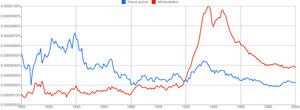
Abracadabra (the red line) rises in popularity in the 1920s.
From our Magic Words outpost: Our intriguing magician friend Chris Philpott posed an interesting question about the preponderance of the two most popular magic words: So since you're The Man on magic words (and you are, whether you like it or not) I have a question for you. My most recent blog was about trying to find various magical applications for Google's Ngram viewer -- as you may know, this is Google's database of all the millions of books they've digitized -- you can enter a word or phrase and see its relative popularity over hundreds of years. I was putting in various magic-related words (like magicians' names and various magic tricks) when I decided to compare the relative popularity of two well-known magic words, Abracadabra and Hocus Pocus. I discovered the word Abracadabra had a huge surge in popularity in the 1920s (comparable to the word Wizard in the 1990s) -- I suspect there's a reason for the surge (probably as clear as J. K. Rowling's influence on the word Wizard), but I can't think what it would be. Any thoughts? Chris, there are actually two very different answers to your question about abracadabra's surge in the 1920s. Here's our first answer: What we see when presented with a chart comparing word density over time from the Google Books scanspace is both something and nothing at all. It's certainly something because we can perceive it, i.e. the charts dazzle us with their jagged edges and numerous nodes, suggesting the compilation of many data. However, the trends that they argue are circular, based as they are only upon the tiny subset of books which Google has scanned from the periods under consideration. If we had it on reliable word that Google had scanned, say, 95% of all extant publications, we should still consider word density measurements statistically insignificant considering that the missing 5% might contain 95% of the contemporary appearances of "abracadabra" in print. Moreover, Google cannot estimate the readership of its catalog, which would be necessary to make any evaluative claims about the familiarity of a word or phrase in common culture or parlance, which is really what the word density charts are attempting to demonstrate. Words used by authors in printed publications which survived until 2010 are not, by themselves, particularly significant. The field of statistics is famous for its bold sleights of hand. Most any contention can be illustrated by a sufficiently culled data set and evaluative methodology. Google's scanned word data are of course too fun not to keep playing with, but we must always bear in mind their inherent balderdash. Here's our second answer: The rise of "abracadabra" in 1920s is the exhalation of a meme's biorhythm. Decades later, the "wizard" meme began its exhalation, and J.K. Rowling rode the wave. We can't even say that Rowling buoyed the wave -- she is merely part and parcel of a grand expansion cycle. Chris responds: I'm not sure I'm 100% with you on J.K. Rowling -- certainly she rode some kind of wave but I think her talent was a wave generator of its own. I suspect if she had called Harry a "mage", then instead of showing The Wizards of Waverly Place, The Disney Channel would now be showing The Mages of Mulberry Lane. Writers are notorious copycats (though the demands of the marketplace tend to accentuate this weakness).
Indeed, Chris, one definition of "meme" is an expression that can be copycatted. (The Greek root is mimema: that which can be mimicked or imitated). Without discounting Rowling's achievements, let's remember that she didn't coin the word "wizard"; it was already a charming Briticism for "excellent." Just as the common cold spreads one handshake at a time (Richard Dawkins has unsavorily called memes "viruses of the mind"), human culture spawns. Rowling, bless her heart, is simply one node of the complex informational network that enables the "wizard" meme to spread and thrive. |


 |
|
|
 |
 |
 |
From our Magic Words outpost: We're honored to have our insights into "hocus pocus" referenced in Software Studies: A Lexicon, edited by Matthew Fuller. The chapter in question is Marco Deseriis' "Text Virus." |

 |
|
|
 |
 |
 |
We took the liberty of footnoting the multi-faceted, fractal-like puns in a whimsy of our friend Jeff.
When in Greecei
by Jeff Hawkins
Among the more provocative questions debated aboveii the water cooler this week, "self-reincarnationiii, huhiv?" generated more than its fair share of interest by adherents and passersby alike. While the answer to the question may seem, at first, to require an ex partev knowledge of the botanical sciencesvi, a more direct solution can be obtained by first asking how many livesvii might be crammed into the average catviii, then dividing the result by a half dozenix of the udderx. This gives mu, which we immediately recognize as the plaintivexi feline utterance used to summon the butler, Yeatsxii, so that he might refill the vacant cream dishes left on the floor by the careless hand.
Even if those dishes had been bluexiii, the very idea of replicating lives on the flyxiv begs yet another questionxv, then one more: Why cats? Why cats?xvi While the rest of us muddle along, dodging sparksxvii thrown from the axle of the cosmic wheel as it spins, half greasedxviii, toward the window where billions are servedxix, the cat has only to wish itself a new itinerary, and providencexx responds.
Merexxi coincidence? Perhaps. I do not claim to understand Greekxxii.
i Initially a play on "When in Rome," the "Greece" in question will play on fast-food "grease" by the end of the piece.
ii The water in the cooler has evaporated into a "word cloud."
iii This is a play on "self-recursion," a form of infinite nesting (not to be confused with "infinite empty nesting," referring to revitalized marriages when the kids leave home).
iv It's no coincidence that "huh" is a palindrome; palindromes are common in peptide sequences, meaning that human lives loop in the very strands of the DNA.
v i.e., judicious partying.
vi This is the "pot" calling the Grecian Urn black.
vii The rhetorical answer is, of course, nine.
viii The average cat crams 56 prey animals into its mouth each year (24 rodents, 15 birds, and 17 lizards).
ix Why divide nine lives by six? Mathematically speaking, six is nine upside down.
x Hawkins will milk some rich wit with this "udder." The bovine allusion will yield "mu," the famous Zen answer to whether or not a dog has Buddha-nature, even as it echoes "the cat's meow" (synonymous to "the cat's pajamas"). "Udder" also sets up a pig-Latin conjugation: udder/utterance/butler.
xi "Plaintive" echoes the mournful "plaintiff" alluded to the judge's ex parte order.
xii It's little known that William Butler, Yeats earned the comma before his surname while sailing to Byzantium.
xiii "No substitutions" is the common policy on a "blue-plate special."
xiv This is the fly attracted to the leftovers on the blue plate.
xv "Begging the question" is a form of circular reasoning, though don't say that within hearing distance of Aristotle's premises.
xvi Indeed, the word "caterwaul" is of imitative origin.
xvii "Dodging sparks" is an echo of "dogs in parks," chasing their tails in pursuit of Buddha-nature.
xviii The original aphorism was: "The squeaky cosmic wheel gets the oil."
xix This seeming reference to a McDonald's drive-thru is actually an ancient metaphor for the vaginal canal. However, any allusion to sexual lubrication is product of the reader's corrupted mind.
xx Providence, as in Providence, Rhode Island, a clever allusion to the Greek island of Rhodes.
xxi This echo of the cat's meow is nearly the omega word.
xxii The joke, of course, is that "coincidence" is of medieval Latin origin, not Greek.
---
I'm *still* laughing about this one. Masterful!
|

 |
|
|
 |
 |
 |
From our Magic Words outpost: We're delighted to be twice-referenced in Varla Ventura's Beyond Bizarre,
an entertaining collection of stranger-than-fiction stories and
trivia. In the chapter on famous magicians, hoaxes, and feats of human
endurance, see our explanation of why "open sesame" is the most
straightforward magical key. |





Page 59 of 74

> Older Entries...

Original Content Copyright © 2026 by Craig Conley. All rights reserved.
|



